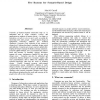Free Online Productivity Tools
i2Speak
i2Symbol
i2OCR
iTex2Img
iWeb2Print
iWeb2Shot
i2Type
iPdf2Split
iPdf2Merge
i2Bopomofo
i2Arabic
i2Style
i2Image
i2PDF
iLatex2Rtf
Sci2ools
HICSS
1999
IEEE
1999
IEEE
Five Reasons for Scenario-based Design
Scenarios of human-computer interaction help us to understand and to create computer systems and applications as artifacts of human activity
Related Content
| Added | 03 Aug 2010 |
| Updated | 03 Aug 2010 |
| Type | Conference |
| Year | 1999 |
| Where | HICSS |
| Authors | John M. Carroll |
Comments (0)

